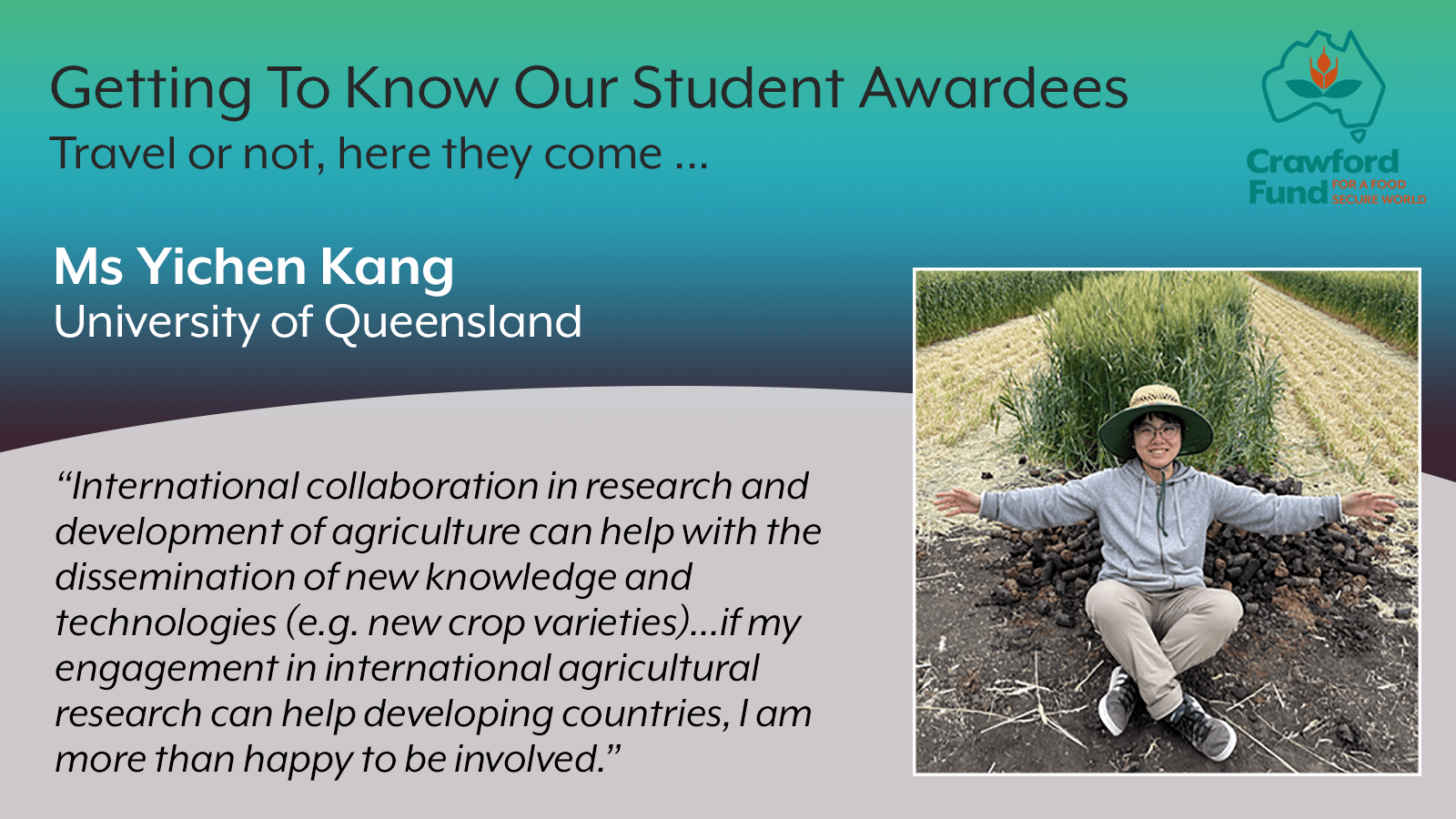

Getting to know our Student Awardees – Yichen Kang, The University of Queensland
February 14, 2022

Last year we announced our 2021 Student Awardees – those talented students from around Australia selected by our State and Territory Committees to experience international agricultural research and development first-hand, in a COVID safe manner of course!
The 2021 recipients will carry out research across a diverse range of topics, focused in Australia, Laos, Uruguay, Vietnam, Fiji, Samoa, Uruguay, Malaysia, Brazil, Nepal and Myanmar. We would like to thank our partner organisations for making these opportunities available, including the Australian Centre for International Agricultural Research, Grains Research and Development Corporation, International Maize and Wheat Improvement Center (CIMMYT), and the Sunrice Rice Research Facility.
We are excited to now bring you more details of each of our Awardees, their projects, and what they hope to achieve with the opportunity provided by our support. We are pleased to also provide input from our awardees’ supervisors on what they see as the benefit of the opportunity to add an international component to their student’s studies and research.
Presenting:
Yichen Kang
PhD Student
The University of Queensland
Research – Designing roots to enhance durum wheat yield
Supervisor
“This Award will support Yichen’s visit to Mexico where she will screen the CIMMYT wheat breeding lines for water-use efficiency traits. By working with the local team, Yichen will have an opportunity to apply her skills and knowledge and contribute to developing drought tolerant crops for farmers in Asia and Africa”
Assoc. Prof. Lee Hickey, Principal Research Fellow, Centre for Crop Science, Queensland Alliance for Agriculture and Food Innovation, The University of Queensland
How did you become interested in international ag for development and focusing your research in developing countries?
Agriculture is the mainstay of economic growth in developing countries, where the population grows faster than the rate of food supplies. However, different sorts of limitations existing in, such as the agricultural technology adoption and the capacity of managing scientific research, have made improving agricultural productivity and income in these countries relatively slow and difficult.
International collaboration in research and development of agriculture can help with the dissemination of new knowledge and technologies (e.g. new crop varieties). The developing world could capitalise on this opportunity to feed their people.
My inspiration did not come a long way, in fact I am also from a developing country, and I am always wanting to do something that could benefit people of similar background. Apart from that, I think I am also motivated by Mr Yuan Longping, a great rice breeder who passed away a few months ago. He is the person that I have heard about a million times since I was a little kid. But at that time, I had no idea about how great his contribution was to the country, but I knew that my grandparents felt thankful of having Mr Yuan. Because my grandparents said so, I will believe in it as their generation has experienced food poverty. So, they know how important it is to be free from hunger. Unfortunately, such food insecurity nowadays still happens in many developing countries. Although I may never be a scientist like Mr Yuan, if my engagement in international agricultural research can help developing countries, I am more than happy to be involved.
Have you had any former experience in ag for development?
My bachelor, master by research, and currently ongoing PhD are all agricultural science related. But in practice, in terms of bringing in actual benefit, my knowledge is yet to be applied.
Are there benefits to Australia from the proposed award work?
The demand of Australian-produced durum has increased in recent years by key European markets. To support its export growth, delivering improved varieties is critical for production expansion in Australia. Because the proposed research will be conducted in diverse environments in Obregon (CIMMYT), combined with local experiments across QLD, we will be able to assist in defining breeding targets in Queensland. Developed varieties are expected to increase yield in Australia, improving national profitability and production capacity.
Please tell us about what you hope to do as part of your award and the impact it may achieve.
If I am able to travel to CIMMYT, besides conducting field experiments, I hope to attend some training courses provided by CIMMTY as well. These courses I believe will not only give me hands-on experience, but also let me interact and connect with international scientists. Such opportunity will benefit my future career as an agricultural researcher.
Do you have a strategy to carry out the award research, even if travel is not possible, that you’d like to share with other awardees?
Our collaborators at CIMMYT will conduct field experiments for this project if I cannot travel there. In this case, I will focus on data analysis and interpretation. Even though I may not be able to communicate with project collaborators in person, I still can effectively have regular Zoom meetings and discussions with the CIMMYT partners. I think updating each other is the most important, to make sure things are in progress and the outcome can be generated in a timely manner.
What do you want to be working on in the future?
I am passionate about all fronts of agricultural research (e.g. crop breeding, physiology and implementing state-of-the-art phenotyping technologies), so I am open to any possible opportunity in terms of the research focus. However, I do hope my future career will be engaged in international scientific collaboration and international mobility.
Do you have advice for others interested in getting involved in international ag development?
Talk with someone who is committed to international agriculture development. This will give you an overall feeling of being engaged in this area, and perhaps some ideas about what particular sector you would like to work in. Also, be an active learner and always update yourself with new knowledge and you will never go wrong.




